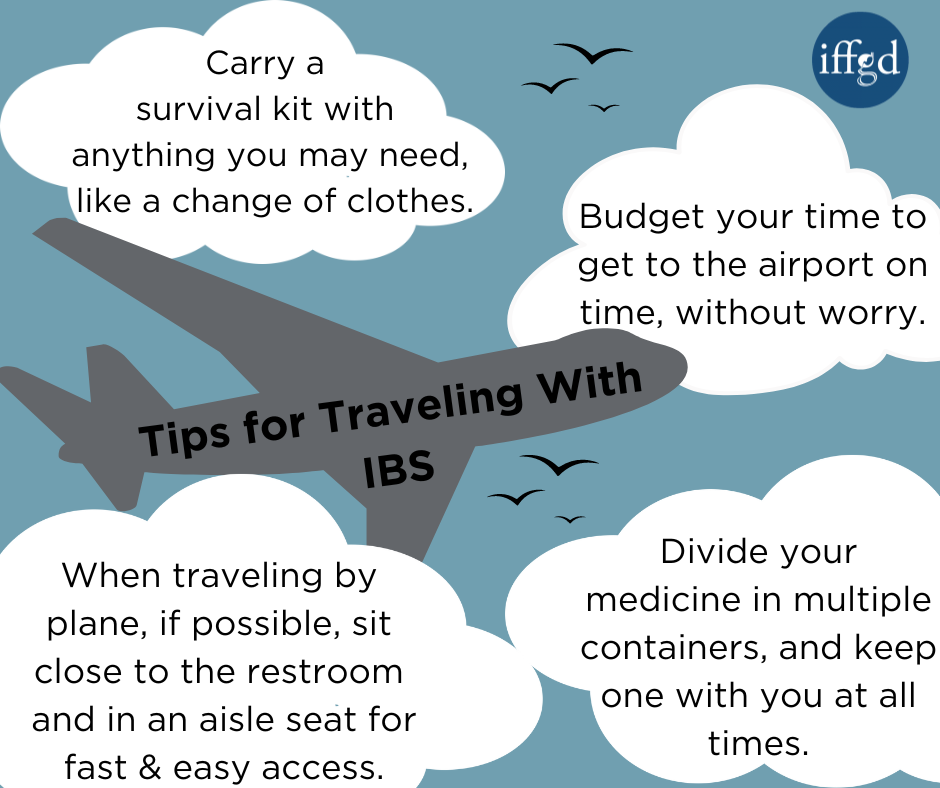Managing irregular and often painful bowel symptoms involves much more than accommodating minor inconveniences. The challenges are many, and effective treatments few. Travel, whether for leisure or work, can be very difficult for those with irritable bowel syndrome (IBS). The uncertainty of when and where symptoms may occur can cause fear of not being able to control symptoms when away from home. If you are one of these persons, here are some travel tips designed to help you avoid and manage symptoms, and help create a sense of being more in control when traveling.
IFFGD’s Travel Tips
- Allow enough time in the morning to get to the airport on time without worry. When traveling to and from your destination, bring an extra bag with a change of clothes in the event that your luggage is lost.
- Carry a “survival kit” with you. Choose something you are comfortable with, such as a computer bag, briefcase, large purse, or backpack. Throughout your trip, always have a change of clothes with you, and bring a small supply of tissue in case there’s none available when you are out.
- Traveling by plane can be difficult for those who suffer from bowel symptoms. Ask to sit as close to the restroom as possible. Also, sit on an aisle for easy and fast access so you will not have to ask others to move.
- When planning your trip, consider driving if possible. Some people may feel more comfortable traveling by car because they can stop when necessary to use a restroom or take a break. There is a greater sense of control when traveling by car, as you don’t have to be on someone else’s schedule or timetable.
- If you are making a long drive to get to and from your destination, know how much distance there is between rest areas or highway exits with available restrooms. Map your walking and driving routes ahead of time and determine how to get from point A to point B as quickly and directly as possible. Some people may avoid buses, boats, and other transportation that do not have accessible restrooms.
- Avoid lodging where multiple rooms share a single restroom. To help ensure access to a restroom, if you know you will be arriving before check-in time, ask for early check-in; if you need to check out later, don’t hesitate to ask. Most hotels will accommodate your needs.
- Avoid foods and beverages that you know can aggravate your symptoms. Meals that are large or high in fat, fried foods, coffee, caffeine, or alcohol may provoke or worsen symptoms of abdominal cramps and diarrhea. This is not the time to experiment. Eating in restaurants may be challenging – stick with foods with which you are comfortable.
- If you are traveling outside your home country, know how to ask where the restroom is in the local language, and always have change for pay toilets. Public restrooms are usually available and accessible in the United States, but may not be in other countries.
- Know what documentation may be necessary to refill prescriptions at your destination.
- Divide your medication(s) into two containers; keep one in your hotel room and one with you at all times.
- Bring your physician’s contact information with you. If you are traveling internationally, consider bringing an international cell phone or purchasing an international calling card so that you can reach your physician if necessary.
IBS presents daily challenges or obstacles to deal with. Having your own personal management plan can help you enjoy your vacation time and manage your travel experience. Some plans may need to be changed at the last minute. Discuss this ahead of time with your family or travel companions. Try to be flexible – tomorrow may well be a better day.
Adapted from IFFGD Publication #188 Travel Tips to Help IBS Sufferers and Others with Bowel Disorders Enjoy Their Vacations by IFFGD










